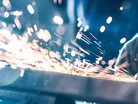Why are steel prices on the rise?

Steel is an essential material for all businesses in the construction industry. From cars to buildings and everything in between, it is a valuable resource but, as recently discovered, it is also becoming more expensive, especially in the United States. But why is this?
COVID-19
COVID-19 is the biggest cause of the rise in steel prices. The pandemic, in turn, has disrupted supply chains meaning steel as a material could not be shipped to construction sites, and that resulted in a higher price. However, once the height of the several lockdowns subsided, the price of steel remained high, even though those in the US steel industry expected it to drop.
According to the American Iron and Steel Institute (ASI), the US steel capacity utilisation rate has “remained at or above pre-pandemic levels of 80pc” for the last three weeks. This suggests that there is more steel available for buyers in a previously supply-constrained market.
During this time, the US Midwest hot-rolled coil (HRC) assessment by Argus Media increased by 2pc, or US$33.75/short ton (st). According to Argus, this is similar to a typical pre-pandemic price increase, which was US$40/st when announced by steelmakers. This price hike, which has seen steel costs quadruple since August 2020, continues onwards, leaving many people in the industry wondering what will happen in the future.
However, according to Argus Media, the Indiana-based electric arc furnace (EAF) minimill steelmaker Steel Dynamics (SDI) expects “post record profits” in the second quarter and that continued demand and "historically low flat roll steel inventories" will lead to even stronger third-quarter results.
Currently, though, the high steel prices mean that very few construction companies are looking to restock their supply of the material, meaning a delay to certain projects.
The automotive industry
One industry that’s been negatively impacted in particular is the automotive sector. Carmakers in North America have been dealing with disruption to their semiconductor production line for almost half a year, resulting in volumes at some steel processors being significantly reduced. In finding a solution, some car manufacturers, such as Ford, have looked at the idea of idled auto production online, although this is still in the early stages of development.
According to Cox Automotive,1.78mn new vehicles were manufactured in coming into June which is only a 35-day supply, and one of the lowest levels of production in history. By comparison, new car inventory was at 2.24mn at the end of April 2021.
This could mean automakers’ demand for steel reduces if the price remains, further constricting the spot steel market. It is clear that the rising price of steel is having a substantial impact on the industries that rely on it.
Fossil-free steel rolling
Partnering with Ovako, Volvo, Hitachi ABB, and H2 Green Steel, Nel ASA has today announced that it is planning a fossil-free hydrogen facility for steel rolling and milling operations in Hofors, Sweden.
The conversion to green hydrogen in the production process aims to reduce CO2 emissions from the facility by 50% from current levels with possibilities for future development of hydrogen infrastructure for transportation, the company said.
The initiative will focus on developing a fossil-free steel production facility, with the intention of taking the first step towards creating a future hydrogen infrastructure for the transport sector. The investment of approximately SEK180mn is supported by the Swedish Energy Agency via the Industriklivet initiative and will create significant benefits for the wider society from multiple perspectives.
Jon André Løkke, Chief Executive Officer of Nel ASA, said: “"We will work collaboratively together to make this project a success, based on the joint learnings we will standardize the overall solution and ensure that this can be replicated in different locations all across Europe”.
- How Industrial Power Connectors Boost Site SafetyConstruction Projects
- IFS and Anthropic: An AI Alliance For Heavy IndustryTechnology & AI
- Currie & Brown: How Global Volatility Hits ConstructionConstruction Projects
- Gensler Leveraging Climate Tech for Built EnvironmentSustainability & Green Building



